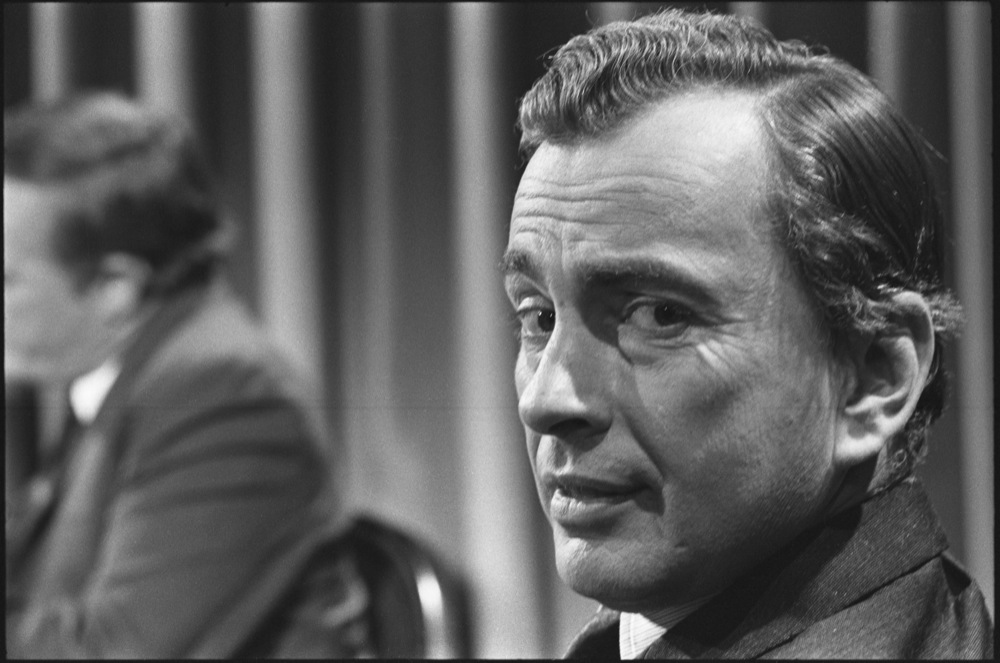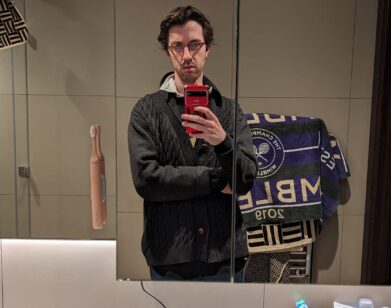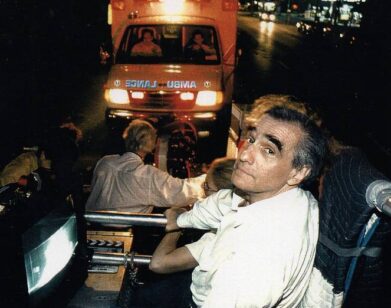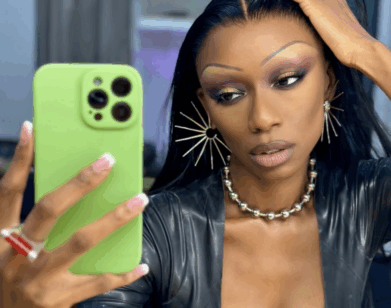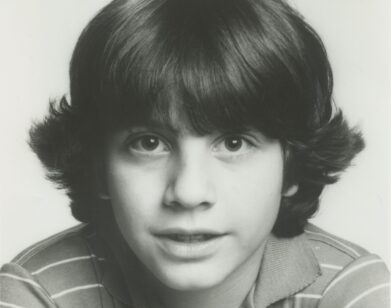Punditry’s Primetime Premiere
For many years, a framed photo of Gore Vidal and William F. Buckley sat above the bathtub at Vidal’s home in Ravello, Italy. It was not, to say the least, a marker of friendship. The two were bitter enemies, and Vidal never missed an opportunity to confirm the fact. Perhaps the kindest insult he ever hurled Buckley’s way was a sarcastic, “Buckley? I never think about it. I suspect he is not as nice as he looks,” in the pages of Interview. Despite—or perhaps because of—their antithetical political views, the two intellectuals had an astounding chemistry, and together, they helped start one of America’s favorite sports: television punditry.
Co-directed and co-produced by Robert Gordon, a Grammy Award-winning writer and filmmaker, and Morgan Neville, who won the 2014 Academy Award for Best Documentary Feature for 20 Feet From Stardom, the new documentary Best of Enemies explores the story behind that photograph Vidal kept above his tub. During the summer of 1968, ABC televised a series of debates during the republican and democratic conventions. Richard Nixon and Hubert Humphrey were on the ballot, the Vietnam War was a major point of debate, and a new wave of conservatism pioneered by Ronald Reagan’s mentor Senator Barry Goldwater was sweeping certain states. Vidal, a novelist, playwright, friend of Tennessee Williams and Paul Newman, and relative by marriage to Jacqueline Kennedy Onassis, was vehemently liberal; Buckley, an author and founder of the magazine National Review, was notoriously conservative. The tension—and Vidal and Buckley’s vitriol towards one another—was palpable. Their first debate at the republican convention was as shocking to viewers as it was to the network that hosted it, and the irony of the convention center’s roof nearly caving in during the debate is hard to miss. As the two discussed the issues of the day, the course of media was changed, as were the personal trajectories of the two polemical public intellectuals. Within one appearance, the combating duo took hold of America’s living rooms, and in 2010, they caught Robert Gordon and Morgan Neville’s attention, too.
We sat down with Gordon and Neville in New York to discuss the advent of punditry, media fragmentation, and how things have changed since those great debates.
HALEY WEISS: How did this project come about?
ROBERT GORDON: A friend of mine in Memphis named Tom Graves had a bootleg DVD of the debates and shared it with me. I was blown away by the men and their ideas and their wit and their language, and thought it would make a great documentary film. It seemed like it would be a good one for [Morgan and I] to collaborate on, we’d done four [films together] prior. So I called Morgan and said, “Do you want to see a pretty cool DVD?”
MORGAN NEVILLE: And I said, “Yes!” [Gordon and Neville laugh] “How about tomorrow?” Even though we’ve both made a lot of music films, I think we’re both political junkies. Even our music films are about more than just music, and in just watching the raw debates, we felt like there was a big story. We didn’t know what it was, but we saw that there was something in the way that these guys talked and the space they were given on national television, and the largeness of their character—that was something we wanted to spend time on. When you make a documentary, you’re willing to jump into the rabbit hole and spend, in this case, five years with these guys. But it was a subject that never got boring, which is not always true.
WEISS: Were you able to speak to Buckley before he passed away in 2008?
GORDON: No … but we did speak to Vidal.
WEISS: But you decided not to include that interview. What was your reasoning behind that?
GORDON: There are two things. I’ll take the first one, which is that we went to Vidal, and he did not want Bill [Buckley] held up to the same esteem that he was held at, and so our whole premise was something that he couldn’t agree with. So although he agreed to be interviewed—
NEVILLE: Because [as Vidal once said], “you don’t turn down sex or television.”
GORDON: I felt like he sabotaged the interview. He answered in ways where he knew we couldn’t use [the footage]. It was a quandary. He was old, he was in physical pain, he was wheeled in, and he didn’t look at anybody. Tom, one of our crew, was there, and he said, “My uncle served in the Aleutian Islands at the same time you did during WWII and he said he could never get warm,” and Gore looked up and made eye contact, shooting lightning bolts out of his eyes, and the first thing he says to us was, “I have my rage to keep me warm.”
NEVILLE: It was a long, extremely uncomfortable interview. We debated using it after, but it felt unfair to Buckley to have Vidal speaking and not have Buckley speak. I also don’t think Gore was necessarily the best, how should I put it… [pauses] He wasn’t the best person to tell his own story. He was an unreliable narrator.
WEISS: I read an interview that Vidal did with his friend Monique van Vooren for Interview in 1976. In the interview he was asked what his perfect day would be and he listed all of the television shows that he would go on. He said he’d start with the Today Show, go to the Mike Douglas Show, and so on, ending with Merv Griffin and Carson. It makes sense that [both Buckley and Vidal] would have been attracted to television as a medium because they had this wit and they liked to entertain, but they were also public intellectuals.
NEVILLE: It gave them a huge platform, too, for their ideas. I think they both felt that they were onto something that their other writer friends and intellectual friends weren’t onto. They had figured out very early on that television was not just a boob tube or something to scoff at. Television was a way of actually getting your point-of-view, and your name, and your ideas out there.
GORDON: And not only that, it went right into your living room. In the same way that Elvis shook the world by reaching into the living rooms. It wasn’t like he came down from on high; he was at your hearth. I think that their appreciation for TV also came from that there was a certain risk at the time, in the early ‘60s, of going TV as a high-minded intellectual, because TV was disdained. But they were not part of that establishment culture; they had come in from the outside. Their background allowed them to take risks that other blue bloods might not have taken.
NEVILLE: They weren’t establishment even though they became establishment. Buckley was not part of the republican establishment, and Vidal was never a joiner of any establishment. So it gave them a platform they couldn’t find otherwise, and that’s part of what made them so good on television. You never felt like they were party shills. They were unpredictable at all times which is captivating to watch.
WEISS: When watching the film I was struck by the presence of the television as a staple in the living room. While I knew that televisions were much larger in the ’60s, actually seeing them as these weighty objects with warped screens was something else. It’s interesting to think about how now we have many more screens, but they’re mostly flat. I’m wondering how you see people interacting with television differently now because of that?
GORDON: The culture has changed, and the environment has changed. If you think about changes in environment, there used to be dinosaurs, but now there’s not. With [our] environmental change, television has become much more packaged and processed, so you don’t get 15 uninterrupted minutes to have a conversation. The moderator doesn’t stay out of the way to let the guests talk. The place of the public intellectual on TV disappeared; there’s just not a place for it anymore.
NEVILLE: Now we have a punditocracy. Hundreds of people go on [television] and you have no idea what their legitimacy is. The technology side of it, which you mentioned, is that television back then was basically three networks with limited programming throughout the day. That was many people’s sole connection to the larger world. That kind of attention, and common meeting place—the public square—is completely gone. Yes, we have 1,000 screens but there is so much to distract us. There are good things and bad things about it, but there’s no place where we all come together and even see the same things anymore, much less come together to share the same facts or ideas. One of the larger things we’ve been talking about is how the decentralization of media has led to the decentralization of truth.
GORDON: The delegitimization of fact.
NEVILLE: [Robert] has been quoting a Daniel Patrick Moynihan line that, “Yes, you’re entitled to your own opinions, but you’re not entitled to your own facts.” Well, that’s not true anymore. Everyone feels entitled to their own facts.
GORDON: [Whether they’re] true or not, and without even investigating the truth. Morgan mentioned that you don’t know the authority of whose saying what anymore. A search engine searches for words, it doesn’t confirm facts. You can find anything on the Internet that to you, if it looks real, it is real. It’s as real as the next web page.
NEVILLE: And Google knows what your political preferences are based on your history and will feed you the truth it thinks you want to hear.
WEISS: I was trying to come up with an example, with increasing media fragmentation, of a television event that could capture an audience in a similar way to the way that Buckley-Vidal debate did. The closest example I could come up with, which is quite far off, would be the 2012 vice presidential debate where Biden was making all of these faces and people we’re very entertained by them, and it became this Internet phenomenon. But the gravity of the content wasn’t there.
NEVILLE: The presidential and vice presidential debates are those rare moments when people come together but to even call them debates is a stretch because they’re played by such negotiated rules and they’re so over-rehearsed. It’s exactly the opposite of what makes [the Buckley-Vidal] debates compelling, which is that you never know what someone is going to say.
WEISS: The content of the Buckley-Vidal debates seems as applicable now as it was then.
GORDON: I think in a way that was anticipated by [Buckley and Vidal]. That’s perhaps what excited me the most when I first saw [the debates]. This is the culture war today, articulated and embodied by these two guys. Richard Wald makes the point in the film that this is an argument about lifestyle. Which is to say that this is an argument about culture, about can you be gay and making points for the average American? We can see the outrage and the offense that each side takes in the other, which is why I think that this is a battle for the nation. [For Buckley and Vidal], there’s nothing less than a battle for the future of the country at stake.
BEST OF ENEMIES COMES OUT TOMORROW, JULY 31.

